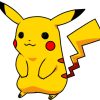For kids it means media that has social currency. When a kid pulls out a Pokemon deck or a game boy, you’ll see a kind of flocking behavior – the media is the social glue, the common language that means you belong in the same cultural universe. After almost every basketball game that I take my son to, the boys pull out their game boys and start exchanging monsters, tips, and cheats about how to get ahead in the game. The same goes for birthday parties and sleepovers these days. Even with parties that my daughter is invited to, there will often be explicit instructions – pack your bathing suit, sleeping bag, and game boy. Media culture, and media devices are what Anne Haas Dyson has called a “ticket to play.”
Another way to think about Pokemon is that it is a social vocabulary, a set of tokens that kids can exchange to position themselves and gain status in the social universe. Just like any other form of language and literacy, this is a vocabulary that is shared among a social group. And just like other kinds of vocabulary, being literate means being able to read and decode the language, and the ability to express oneself. And this is what I mean by social communication through media making. When kids put together their pokemon deck, they put together a unique combination of characters and abilities that reflect a personal identity and style of play. They will debate the merits of having a deck focused on grass, water or fire pokemon, or centered on particular combos and strategies. For many generations people have socialized around media like books, television, music, and movies, and often creating deep person [(sic?) personal, ed] identification with the media content and characters. What is different about current interactive digital media, like pokemon is that personalization and remix is an actual precondition of participation. It is at its very core about engagement and communication.
And remember too that Pokemon is a global media franchise – I’ll return to that a little later in the talk.
You might be thinking that Pokemon doesn’t seem much like media making. Okay, it might be a complicated and rich set of media building blocks, but it is after all, just about recombining elements handed down by commercial culture. And while a Pokemon deck does involve a certain amount of cultural virtuosity and even creativity, it is hardly what one would call media authorship at least in the traditional sense.
All this is true. But I like to think of Pokemon as training wheels for participation in digital culture. Let’s take this a few steps further. As players get more sophisticated about their use of the tools and language of digital culture, communication with other players starts looking more and more like media making.
(via Mimi Ito: Media Literacy and Social Action in a Post-Pokemon World)
